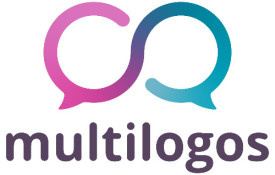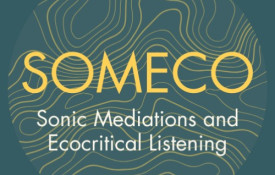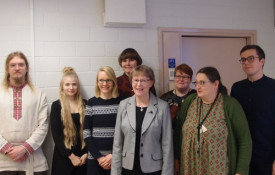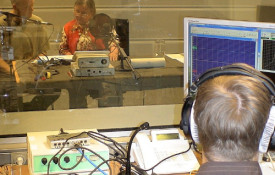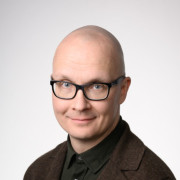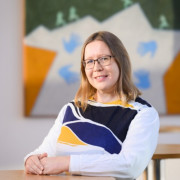Human mobility is constantly on the rise. The world is getting smaller ‒ and bigger ‒ through the increased number of linguistic and cultural encounters. There is an ongoing need for more versatile and reform-oriented expertise in these encounters.
Here, at the School of Humanities, we offer an excellent opportunity to study languages and culture from a Bachelor’s degree to doctoral studies. Our research and education are diverse and international, and we encourage a multidisciplinary approach to studying how languages and cultures meet, generate meaning and affect our lives.
The School of Humanities constitutes part of the Philosophical Faculty.
105
Staff members (2024)
1,341
Degree students (2024)
100
Peer-reviewed publications (2024)
Studies
The School of Humanities offers high-quality education in Foreign Languages and Translation Studies, and Finnish Language, Cultural Research and Logopedics. We educate language teachers, translators, Speech therapists and various other experts in languages and cultures to work, for example, in research, media, non-profit organizations and businesses in both public and private sectors.
You can take advantage of the wide variety of academic subjects that we offer and, with the help of our student-centred guidance, compile a degree that suits your personality and gives you a competitive edge in the job market. You can complement your degree with courses and modules on offer at our own school or at any other school of the University of Eastern Finland. Our international exchange networks and three international Master’s degree programmes guarantee that you have plenty of opportunities for internationalisation.
In addition to our programmes taught in English (see below), we also offer a variety of degree programmes taught in Finnish. To learn more about our degree programmes, please visit our page in Finnish.
Doctoral programme and international Master's degree programmes
Research
Here, at the School of Humanities, we conduct state-of-the-art research in the profile area of cultural encounters, mobilities and borders. As an emerging field, we are developing digital humanities, but our main research priorities concentrate on contacts between languages and cultures, which is an extremely topical research area because of the constantly increasing cross-border mobility and interaction.
In digital humanities, we focus on the cultural study of technology and on language and translation technology. This is our response to the ever-increasing pace of technological development and the way it changes people’s lives. We are interested in the multidisciplinary opportunities that advancing technology has to offer for research.
The driving forces of our research are multidisciplinarity and the high social impact of its results.
Research areas
The School of Humanities focuses on cultures as objects of research in several disciplines including literatures in Finnish and other Modern Languages as well as in cultural studies. In our research, culture is understood in a wide sense as art and folk culture, popular and media culture, and above all, as a form of people’s everyday life. What is central to all of them are various encounters. For the researchers at the School, culture takes the form of different texts and performances in diverse media, sensual, disciplinary, and socio-cultural systems. In terms of method, cultures, their members and products are examined using different textual, ethnographic, and other field methods. The study of cultures is interdisciplinary and is based on international contacts and transnational networks. Many research projects in the field are linked with the BOMOCULT Research Community and contribute to the Cultural Encounters, Mobility, and Borders Profile Area at UEF.
At the heart of language research, we find language contacts, multilingualism, the regional and social variation of language, and language and its typical and aberrant development.
In the subject of Finnish, the research has focused on the variation and change of Finnish regional dialects, syntactic phenomena of spoken language and the Baltic Finnish languages, especially the Karelian-Finnish language contacts and the social situation of the Karelian language.
In the field of English, we are internationally renowned in the study of world English, with a focus on the use of English in a multilingual environment as well as the structural variation of modern English. We also cross disciplinary boundaries and collaborate with computer science in the study of computational sociolinguistics, which uses large data sets and utilizes computational expertise in their analysis. Research in this area focuses on the diffusion of innovation in digital social networks.
The department also examines Russia in the light of historical and current language contacts, as well as Russia in the media.
In the field of general linguistics and language technology, acoustic research of both typical and atypical (pathological) speech and the application of statistical and machine learning methods to speech research are carried out, also partly in collaboration with computer science.
In the field of logopedics, research focuses on the developmental challenges of language in large original and registered materials in national and international collaboration, including cooperation with UEF's School of Computing. Research is also being conducted on multilingualism, children’s speech challenges, adult aphasia, and swallowing.
Research in translation studies at the School of Humanities is versatile and belongs to one of the university’s main strategic profile areas: cultural encounters, mobilities and borders. Translation-related questions are often investigated from a cognitive or sociological perspective, and the key areas include the various phenomena involved in translation process, translator’s competence and expertise, translation and ideology, translator training, and the status and working conditions of professional translators. Translation studies can also be combined with cognitive linguistics and contact linguistics, for example, when analyzing the transfer of linguistic messages in different translational contexts or scrutinizing such forms of non-professional translation as military or journalistic translation or the translation of endangered languages. Other important areas include corpus research and the study of translation technology especially with respect to translator training, translators’ work as well as the reception of translations.
Communication Studies explore communication as a social and cultural phenomenon whose significance continues to grow in an increasingly digital society. The field examines national, transnational, and international forms of communication and their impacts, recognizing that media trends, uses, and meanings continually cross cultural and national boundaries. From this perspective, communication is understood both as a global process and as a locally constructed practice shaped by social, economic, cultural, and political contexts.
Research in Communication Studies addresses themes such as affects, crises, conflicts, polarization, and populism, along with the broader communicative phenomena connected to them. A particular focus is placed on audiovisual communication—including social media videos, podcasts, film, and television—and on the role of visuality in shaping how meanings are produced and shared. The Communication Studies also examines artificial intelligence as a rapidly evolving dimension of communication, exploring its uses, ethical implications, cultural significance, and effects on the public sphere.
Communication Studies at UEF is fundamentally multidisciplinary and grounded in strong international collaboration. It brings together perspectives from the social sciences and humanities to understand how communication is formed, how it influences individuals and societies, and how it transforms alongside broader social processes.
Our research groups and projects
Working life cooperation
We collaborate in various ways with businesses and organizations. Cooperation provides the working life partner with contacts to the future experts of languages and cultures as well as new perspectives, knowledge, and solutions. We take the needs of the partner into account in all forms of co-operation, be it a part of a course, practical training or working life events. Cooperation is possible with all subjects of studies in the School of Humanities. Learn more about the forms of cooperation and join our working life network.
News and events
News
Contact information
Please find a comprehensive list of staff members in UEF Connect, where you can also search people by name or key word.
University of Eastern Finland’s Student and Learning Services is responsible for providing general study-related administrative services for students and staff, as well as offer support for applicants.
Postal address
University of Eastern Finland
Philosophical Faculty
School of Humanities
P.O. Box 111, FI-80101
Finland
Visiting address
Yliopistokatu 4, Agora





